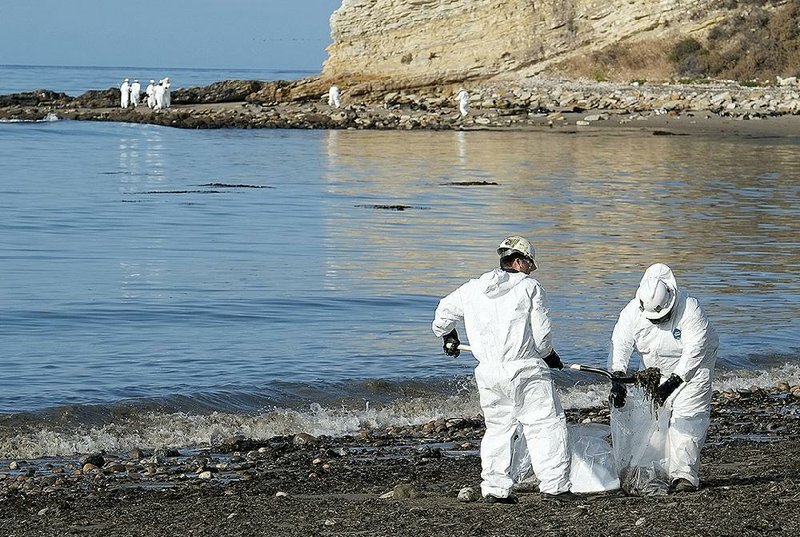GOLETA, Calif. -- An oil spill that fouled beaches and threatened wildlife along a stretch of the California coast spread across 9 miles of ocean Wednesday as cleanup efforts began and federal regulators investigated how the pipeline leaked.
Dozens of workers in white jumpsuits were on the beach Wednesday morning to scoop up oily sand and place it into buckets. Boats towed booms into place to corral the two slicks off the Santa Barbara coast.
Up to 105,000 gallons spilled from an onshore pipe, and about 21,000 gallons reached the sea, according to estimates provided by officials.
The rupture on the 11-mile-long underground pipe was first reported about noon Tuesday after a woman at Refugio Beach smelled the crude's noxious fumes.
Crude was flowing through the pipe at 84,000 gallons an hour when the leak was detected. It took three hours to shut down.
Federal regulators from the Department of Transportation, which oversees oil pipeline safety, were investigating the leak's cause, the pipe's condition and potential regulatory violations.
Gov. Jerry Brown declared a state of emergency in Santa Barbara County on Wednesday night. The move frees up emergency state funding and resources to help in the cleanup efforts.
The 24-inch pipe built in 1991 had no previous problems and was thoroughly inspected in 2012, according to Plains All American Pipeline LP, which owns the pipe. The pipe underwent similar tests about two weeks ago, though the results have not been analyzed yet.
"Plains is taking responsibility and paying for everything associated with this spill," said Darren Palmer, a district manager with the company.
Santa Barbara County District Attorney Joyce Dudley said her office, along with the state attorney general, is investigating the pipeline spill for possible criminal prosecution or a finding of civil liability.
A combination of soiled beaches and the pungent smell of petroleum caused state parks officials to close Refugio State Beach and El Capitan State Beach, both popular campgrounds west of Santa Barbara.
Still, tourists stopped along the Pacific Coast Highway to see the disaster from overlooking bluffs.
"It smells like what they use to pave the roads," said Fan Yang of Indianapolis, who was hoping to find cleaner beaches in Santa Barbara, about 20 miles away. "I'm sad for the birds -- if they lose their habitat."
The early toll on wildlife included two oil-covered pelicans. Biologists were seen counting dead fish and crustaceans along sandy beaches and rocky shores.
The department closed fishing and shellfish harvesting for a mile east and west of Refugio beach and deployed booms to protect the nesting and foraging habitat of the snowy plover and the least tern, both endangered shorebirds, a spokesman said.
Members of International Bird Rescue were prepared to clean any birds covered with oil.
The coastal area is habitat for seals, sea lions and whales, which are now migrating north.
"Big oil comes with big risks -- from drilling to delivery," said Bob Deans, spokesman for the Natural Resources Defense Council. "Santa Barbara learned that lesson over 40 years ago when offshore drilling led to disaster."
A much larger spill occurred in the area in 1969 and is credited with giving rise to the American environmental movement.
Large offshore rigs still dot the horizon off the coast, pumping crude to shore. Small amounts of tar from natural seepage regularly show up on beaches. The leak occurred in a pipe that was carrying crude from an onshore facility toward refineries further down the chain of production.
The oil spilled into a culvert running under a highway and into a storm drain that emptied into the ocean. The culvert was blocked to prevent more oil from flowing into the ocean, the pipeline company said.
At Refugio State Beach, construction worker Josh Marsh wore rubber boots and carried a bucket to help clean up the area.
"I'm a surfer, I'm a fisherman -- I like sitting out here and breathing it in," said Marsh, 45. "To see it like this, to see it destroyed -- it hurts."
Information for this article was contributed by Christopher Weber, Brian Melley and staff members of The Associated Press; and by Matt Hamilton, Javier Panzar and Joseph Serna of the Los Angeles Times.
A Section on 05/21/2015
